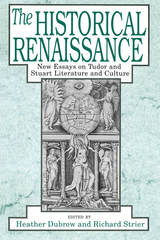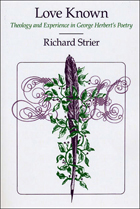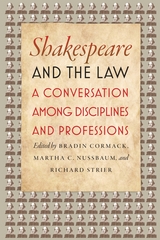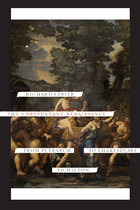4 books about Strier, Richard

The Historical Renaissance
New Essays on Tudor and Stuart Literature and Culture
Edited by Heather Dubrow and Richard Strier
University of Chicago Press, 1988
The Historical Renaissance both exemplifies and examines the most influential current in contemporary studies of the English Renaissance: the effort to analyze the interplay between literature, history, and politics. The broad and varied manifestations of that effort are reflected in the scope of this collection. Rather than merely providing a sampler of any single critical movement, The Historical Renaissance represents the range of ways scholars and critics are fusing what many would once have distinguished as "literary" and "historical" concerns
The volume includes studies of mid-Tudor culture as well as of Elizabethan and Stuart periods.
The volume includes studies of mid-Tudor culture as well as of Elizabethan and Stuart periods.
The scope of the collection is also manifest in its list of contributors. They include historians and literary critics, and their work spans he spectrum from more traditional methods to those characteristic of what has been termed "New Historicism."One aim of the book is to investigate the apparent division between these older and more current approaches. Heather Dubrow and Richard Strier evaluate the contemporary interest in historical studies of the Renaissance, relating it to previous developments in the field, surveying its achievements and limitations, and suggesting new directions for future work.
[more]

Love Known
Theology and Experience in George Herbert's Poetry
Richard Strier
University of Chicago Press, 1983
This book changes the way we read one of the greatest masters of the lyric poem in English. Unlike much recent scholarship on George Herbert, Love Known demonstrates the inseparability of Herbert's theology and poetry. Richard Strier argues persuasively for a strongly Protestant Herbert who shared Luther's sense of the primacy of the doctrine of justification by faith. Cutting across traditional lines, the book is the first sustained study of the theological basis of Herbert's poetry, pointing out connections between Herbert and the Protestant "left" of his own and the following era.
In each chapter, Strier closely analyzes a coherent group of Herbert's lyrics to reveal the theological motives of their movements and design. When placed in a theological context, the poems come into focus in a remarkable way: many hitherto puzzling or unnoticed details are clarified, some neglected poems emerge into prominence, and familiar poems like "Love" (III) and "The Collar" take on new cogency. The chapters build on one another , moving from the darker implications of "faith alone," the insistence on the pervasiveness of sin and pride, to the comforting implications of the doctrine, the assertion of the possibility of freedom from anxiety, and the defense of individual experience.
Love Known thus offers not only a new historical approach to Herbert, but a new appreciation of the relationship between the psychological realism and human appeal of the lyrics and their theological core.
[more]

Shakespeare and the Law
A Conversation among Disciplines and Professions
Edited by Bradin Cormack, Martha C. Nussbaum, and Richard Strier
University of Chicago Press, 2013
William Shakespeare is inextricably linked with the law. Legal documents make up most of the records we have of his life, and trials, lawsuits, and legal terms permeate his plays. Gathering an extraordinary team of literary and legal scholars, philosophers, and even sitting judges, Shakespeare and the Law demonstrates that Shakespeare’s thinking about legal concepts and legal practice points to a deep and sometimes vexed engagement with the law’s technical workings, its underlying premises, and its social effects.
The book’s opening essays offer perspectives on law and literature that emphasize both the continuities and contrasts between the two fields. The second section considers Shakespeare’s awareness of common law thinking and common law practice, while the third inquires into Shakespeare’s general attitudes toward legal systems. The fourth part of the book looks at how law enters into conversation with issues of politics and community, whether in the plays, in Shakespeare’s world, or in our own world. Finally, a colloquy among Supreme Court Justice Stephen Breyer, Judge Richard Posner, Martha C. Nussbaum, and Richard Strier covers everything from the ghost in Hamlet to the nature of judicial discretion.
The book’s opening essays offer perspectives on law and literature that emphasize both the continuities and contrasts between the two fields. The second section considers Shakespeare’s awareness of common law thinking and common law practice, while the third inquires into Shakespeare’s general attitudes toward legal systems. The fourth part of the book looks at how law enters into conversation with issues of politics and community, whether in the plays, in Shakespeare’s world, or in our own world. Finally, a colloquy among Supreme Court Justice Stephen Breyer, Judge Richard Posner, Martha C. Nussbaum, and Richard Strier covers everything from the ghost in Hamlet to the nature of judicial discretion.
[more]

The Unrepentant Renaissance
From Petrarch to Shakespeare to Milton
Richard Strier
University of Chicago Press, 2011
Who during the Renaissance could have dissented from the values of reason and restraint, patience and humility, rejection of the worldly and the physical? These widely articulated values were part of the inherited Christian tradition and were reinforced by key elements in the Renaissance, especially the revival of Stoicism and Platonism. This book is devoted to those who did dissent from them. Richard Strier reveals that many long-recognized major texts did question the most traditional values and uncovers a Renaissance far more bumptious and affirmative than much recent scholarship has allowed.
The Unrepentant Renaissance counters the prevalent view of the period as dominated by the regulation of bodies and passions, aiming to reclaim the Renaissance as an era happily churning with surprising, worldly, and self-assertive energies. Reviving the perspective of Jacob Burckhardt and Nietzsche, Strier provides fresh and uninhibited readings of texts by Petrarch, More, Shakespeare, Ignatius Loyola, Montaigne, Descartes, and Milton. Strier’s lively argument will stir debate throughout the field of Renaissance studies.
[more]
READERS
Browse our collection.
PUBLISHERS
See BiblioVault's publisher services.
STUDENT SERVICES
Files for college accessibility offices.
UChicago Accessibility Resources
home | accessibility | search | about | contact us
BiblioVault ® 2001 - 2024
The University of Chicago Press









